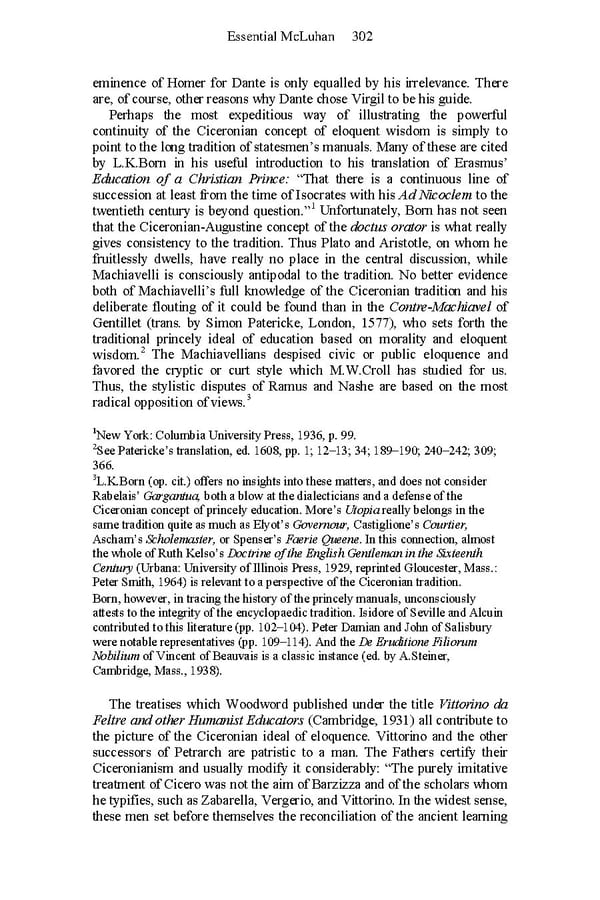Essential McLuhan 302 eminence of Homer for Dante is only equalled by his irrelevance. There are, of course, other reasons why Dante chose Virgil to be his guide. Perhaps the most expeditious way of illustrating the powerful continuity of the Ciceronian concept of eloquent wisdom is simply to point to the long tradition of statesmen’s manuals. Many of these are cited by L.K.Born in his useful introduction to his translation of Erasmus’ Education of a Christian Prince: “That there is a continuous line of succession at least from the time of Isocrates with his Ad Nicoclem to the 1 twentieth century is beyond question.” Unfortunately, Born has not seen that the Ciceronian-Augustine concept of the doctus orator is what really gives consistency to the tradition. Thus Plato and Aristotle, on whom he fruitlessly dwells, have really no place in the central discussion, while Machiavelli is consciously antipodal to the tradition. No better evidence both of Machiavelli’s full knowledge of the Ciceronian tradition and his deliberate flouting of it could be found than in the Contre-Machiavel of Gentillet (trans. by Simon Patericke, London, 1577), who sets forth the traditional princely ideal of education based on morality and eloquent wisdom.2 The Machiavellians despised civic or public eloquence and favored the cryptic or curt style which M.W.Croll has studied for us. Thus, the stylistic disputes of Ramus and Nashe are based on the most 3 radical opposition of views. 1 New York: Columbia University Press, 1936, p. 99. 2 See Patericke’s translation, ed. 1608, pp. 1; 12–13; 34; 189–190; 240–242; 309; 366. 3 L.K.Born (op. cit.) offers no insights into these matters, and does not consider Rabelais’ Gargantua, both a blow at the dialecticians and a defense of the Ciceronian concept of princely education. More’s Utopia really belongs in the same tradition quite as much as Elyot’s Governour, Castiglione’s Courtier, Ascham’s Scholemaster, or Spenser’s Faerie Queene. In this connection, almost the whole of Ruth Kelso’s Doctrine of the English Gentleman in the Sixteenth Century (Urbana: University of Illinois Press, 1929, reprinted Gloucester, Mass.: Peter Smith, 1964) is relevant to a perspective of the Ciceronian tradition. Born, however, in tracing the history of the princely manuals, unconsciously attests to the integrity of the encyclopaedic tradition. Isidore of Seville and Alcuin contributed to this literature (pp. 102–104). Peter Damian and John of Salisbury were notable representatives (pp. 109–114). And the De Eruditione Filiorum Nobilium of Vincent of Beauvais is a classic instance (ed. by A.Steiner, Cambridge, Mass., 1938). The treatises which Woodword published under the title Vittorino da Feltre and other Humanist Educators (Cambridge, 1931) all contribute to the picture of the Ciceronian ideal of eloquence. Vittorino and the other successors of Petrarch are patristic to a man. The Fathers certify their Ciceronianism and usually modify it considerably: “The purely imitative treatment of Cicero was not the aim of Barzizza and of the scholars whom he typifies, such as Zabarella, Vergerio, and Vittorino. In the widest sense, these men set before themselves the reconciliation of the ancient learning
 Essential McLuhan Page 308 Page 310
Essential McLuhan Page 308 Page 310